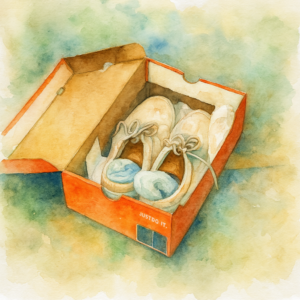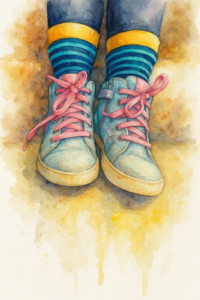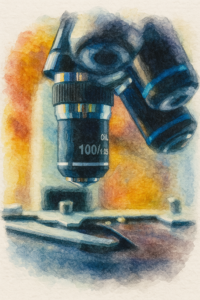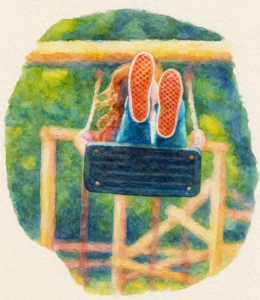Learn French with this clip from Les P’tits Bateaux. Find the full episode here. We do not own the content. The above audio sample and transcription is from Les P’tits Bateaux podcast. We do not own the content. Listen to the entire episode here. very, very airtight What’s opening up for you with this clip?…
Start quiz, type what you hear, then join the conversation.
Did you find this one challenging or easy? Did you hear something diffferent? What surprised you? What levels did you complete? Comment below and share what’s opening up for you with this quiz.
Learn French with this clip from Les P’tits Bateaux. Find the full episode here. We do not own the content.
The above audio sample and transcription is from Les P’tits Bateaux podcast. We do not own the content. Listen to the entire episode here.
very, very airtight
What’s opening up for you with this clip? Comment below with what was surprising, easy, challenging and/or interesting.
The snippet in English
Find a translation of this snippet here, how much of this did you hear?
— Alors j’ai deux questions bonus, Hirac Gurden.
Il y a des gens, on a l’impression qu’ils puent un peu plus des pieds que d’autres — si je puis me permettre — et des chaussures aussi qui font un peu plus puer les pieds que d’autres. Comment on explique ces deux facteurs ?
— Alors, pour les chaussures : si elles sont très, très, très hermétiques — c’est-à-dire complètement fermées par rapport à l’air ambiant — évidemment il n’y a absolument pas d’air qui circule autour dans les pieds. Et là, c’est catastrophique : ça va sentir très, très, très mauvais.
Et pour l’autre question, les pieds qui sentent plus mauvais chez certaines personnes, ça peut être aussi parce qu’elles ont plus de bactéries — donc elles auront besoin de nettoyer un peu plus sous la douche.
— So I have two bonus questions, Hirac Gurden.
Some people seem to have slightly smellier feet than others — if I may say so — and some shoes also make feet smell a little more than others. How can we explain these two factors?
— Well, for shoes: if they are very, very, very airtight — that is, completely closed off from the ambient air — obviously there is absolutely no air circulating around the feet. And that’s disastrous: it’s going to smell very, very, very bad.
As for the other question, feet that smell worse in some people may also be because they have more bacteria — so they will need to clean a little more thoroughly in the shower.
The above translation from Deepl
What does “qui font” mean?
In et des chaussures aussi qui font un peu plus puer les pieds que d’autres, the phrase “qui font” means “that make”.
qui refers to des chaussures (the shoes),
font is the 3rd person plural of faire (to make),
so qui font puer les pieds means “that make feet stink.”
Literal translation:
And also shoes that make feet stink a bit more than others.
Usage notes: This is a natural spoken French structure — faire + verb (here, faire puer) is a common way to say “make [something] do [something]” or “cause [something] to happen.”
Example: Ce fromage fait rire tout le monde (This cheese makes everyone laugh — probably because of its smell!).
What does “hermétiques” mean?
hermétiques means “airtight” or “sealed” — and sometimes “impenetrable” or “hard to understand.”
Ces boîtes sont complètement hermétiques, rien ne s’échappe.
(These containers are completely airtight; nothing escapes.)
Usage notes: Plural adjective, agrees in gender and number. Used literally for containers, doors, etc., and figuratively for abstract things like writing or discussions (un texte hermétique = hard to understand).
Cultural note: In everyday French, calling something hermétique can suggest it’s overly complex, closed off, or inaccessible — especially in art, philosophy, or administration.
What does “par rapport” mean?
par rapport means “in relation to” or “compared to.”
Il est petit par rapport à son frère.
(He’s small compared to his brother.)
Usage notes: Common in both spoken and written French. Often used to compare, contrast, or relate one thing to another. Usually followed by à.
Cultural note: Frequently used in everyday conversation to frame opinions or differences. In casual speech, you’ll often hear it as a filler to add context or soften a statement — par rapport à ce que tu dis… (in relation to what you’re saying…).
What does “chez certaines personnes” mean?
chez certaines personnes means “in some people” or “for certain people.”
Chez certaines personnes, le café provoque de l’anxiété.
(In some people, coffee causes anxiety.)
Usage notes: Chez is used to refer to people in terms of personal traits, reactions, or behavior. Common in medical, psychological, or general observations.
Cultural note: French uses chez this way to talk about internal states or patterns — chez les enfants, chez les artistes, chez moi. It reflects a broader, often human-centered view of where things “reside” or appear.
What does “sous la douche” mean?
sous la douche means “in the shower” or “under the shower.”
Je chante toujours sous la douche.
(I always sing in the shower.)
Usage notes: Very common and informal. Literally means “under the shower,” but used just like “in the shower” in English.
Cultural note: The phrase often appears in jokes, ads, or casual stories, especially involving personal routines or humorous confessions. It’s a relatable, everyday setting in French life and media.
Les P’tits Bateaux Podcast
Official synopsis: Les enfants posent des questions, des spécialistes leur répondent. Jeunes (et moins jeunes !) peuvent poser toutes les questions possibles et imaginables directement par message vocal via franceinter.fr, sauf pendant les vacances.
I recently discovered this podcast from InterFrance and love it. It’s kids posing questions and the host brings in experts to explain. And it’s aimed at young French kids, not French learners. That’s my favorite kind of content. Being for French kids is what makes it so good.
You’ve got real people (a kid, a host, and an expert), all speaking real French — no AI generated stuff here. The kid asks a question, and then an expert explains it in short, clear language. There’s a ton of repetition, natural turns of phrase, and just enough challenge to keep your ears working.
And because it’s meant for French-speaking kids, the adults naturally explain things simply but not condescendingly. You get exposed to rhythm, tone, interjections (bah, ben, alors), and full sentences — but also some real dialogue dynamics. And that’s gold if you’re trying to move from textbook filler to actually speaking and thinking in French.
Improving your French Listening Comprehension with Podcasts
On this site, fast spoken French is finally accessible to all levels. The tool break podcasts into short clips each set to transcription fill-in-the-blank practice. My favorite practice in class is always dictées. While they can seem overwhelming at first, the confidence boost and skills payoff for doing the work pays off. They’re perfect for anyone at any level, from advanced students to those just starting.
We use podcasts and our practice exercises to make it possible for anyone, anywhere to immerse in French with fun and ease. Join us and enjoy French, one short clip at a time. Let’s learn together!
Make the most of the site:
- Daily Podcast Listening: Start your day with a French podcast from our collection. Choose episodes that align with your interests to keep it engaging.
- Active Listening Practice: As you listen, try to pick out key phrases and vocabulary. Use our daily quizzes to test your understanding and reinforce learning.
- Repeat and Shadow: Listen to the same podcast segment multiple times. Try to mimic the pronunciation and intonation to improve your spoken French.
- Note-taking: Jot down new words or phrases you encounter. Review these notes regularly to enhance vocabulary retention.
- Reflect and Respond: After each episode, summarize the main points in French, either in writing or aloud. This helps in consolidating your learning and improving your expressive skills.
- Read More:
- True Beginner or A1 Learners: discover tips learning with podcasts at an introductory level.
- Discover all the podcast clips on FrenchIRL organized by level.
- Top Tips: Here’s how I make the most of my own site.
I created the French In Real Life project because I wanted to understand more than just my teacher and youtubers who cater to learners. I wanted to understand the French I hear in France. I hope you can benefit as much as I have. Become a supporting member for access to all clips.
What’s opening up for you?
Comment below with what’s opening up for you with this clip. What do you love about this? What was challenging? What was easy? Share your learning progress below!
Learn French with this clip from Les P’tits Bateaux. Find the full episode here. We do not own the content. The above audio sample and transcription is from Les P’tits Bateaux podcast. We do not own the content. Listen to the entire episode here. very, very airtight What’s opening up for you with this clip?…
Start quiz, type what you hear, then join the conversation.
Did you find this one challenging or easy? Did you hear something diffferent? What surprised you? What levels did you complete? Comment below and share what’s opening up for you with this quiz.








